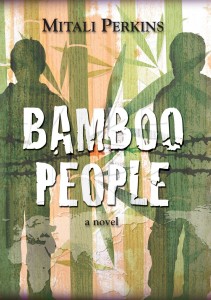Ten years ago I told the story of Captain Albert Mah and Captain Cedric Mah, Chinese Canadian brothers who had amazing adventures flying the Burma Hump during the Second World War. I know that this is a different world than the one Mitali Perkins visits in Bamboo People. I say this only because my research into the country spawned a personal interest in the tragedy of modern-day Burma. I sought out Bamboo People as soon as I heard of it, and now Mitali Perkins has offered me a glimmer of understanding.
I could call Bamboo People a coming of age story, or an anti-war story. Either would be true, but neither would do it justice.
Chiko is a book-loving Burmese boy who wants only to be a teacher. We are drawn into his fear from the first pages. His father, an English-taught doctor, is jailed and perhaps dead for providing medical care to a leader of the freedom and democracy movement. Now Chiko has taken one of his father’s English books into the yard outside his family home in Yangon. He knows he’s taking a risk. He is tired of hiding, feeling as if he is also in a sort of prison.
The characters are vibrant. Chiko and his mother. Their neighbour, the inimitable Daw Widow, and her beautiful daughter Lei. And, after Chiko is brutally pressed into the army, Chiko’s unlikely friend, the street-boy Tai, and the Burmese soldiers who surround them.
Midway the point-of-view switches to Tu Reh, one of the Karenni. The Karenni are among the many oppressed minorities in Burma. Tu Reh watched his home and bamboo fields burned by the Burmese army, and from his new home in a Thai refugee camp he seethes with a desire for revenge. This feeling is magnified by Tu Reh’s friendship for the volatile Sa Reh.
For North American readers the worlds of Chiko and Tu Reh are unstable and frightening even without the conflict they face.
In my opinion the voice is the magic of this story. It is first person, present tense. It is deceptively simple. It seemed to be setting me up for a much gentler story, but soon that simple and honest voice began to speak of terrible things.
And because Mitali has seen with her own eyes she doggedly avoids opportunities for melodrama, or an overtly moralistic message, as she explores the themes of power and violence. In fact, as the worlds of Chiko and Tu Reh descend further and further into madness, as fear and anger grow into bravery and compassion and friendship, this simplicity of voice seems to grow even more fitting. This is elegant storytelling.


One Comment
An elegant review of elegant story-telling. My introduction to your blog came following your comment on my blog dealing with the Winter Olympics: I look forward to following more of your ‘blog-work’ as, from the outset, it strikes the most pleasant of notes which carries with it the hidden but familiar call of needing to be read. Frank